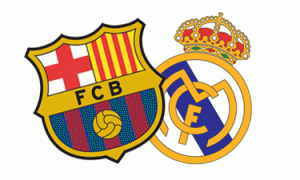
While Spain’s La Liga contest has long been seen as a two-horse race, the Champions League is also starting to show signs of falling into the grasp of the Real Madrid-Barcelona duopoly. That impression is, admittedly, based heavily on this week’s elimination of two English giants from the European competition, Manchesters United and City. But with the two Spanish sides strolling into the knock-out stages, their status as the best in Europe has been further burnished.
So when they meet on Saturday in Madrid’s Santiago Bernabéu to contest the Clásico, the eyes of the world will be on them. Barcelona have eight players nominated for UEFA’s 2011 team of the year; Real Madrid have six. Barcelona have won the last three Spanish league titles and two of the last three Champions Leagues. Madrid have earned less silverware in recent seasons, but are seen as one of the few teams able to put up a fight against the Catalans.
Three points separate them in the league standings, but Madrid’s advantage also includes a game in hand – a huge factor in a league where few teams are equipped to avoid thrashings at the hands of the Big Two.
Such an historic and hyped encounter inevitably invites obsessive arithmetic. But one statistic that cannot be ignored is that in the last seven years, the team that has won the first league Clásico of the season has gone on to win the title. The three points won are crucial, but so too is the psychological blow to the opponent.
For either team, winning this match and the league title is of course a huge prize. But for José Mourinho, in the Madrid dugout, it would be an express train to sealing his reputation as one of the greatest coaches the world has seen.
Mourinho has occasionally mentioned his ambition of winning the “Grand Slam” of league titles in England, Italy and Spain – Europe’s most dominant club football nations. Having already taken the honours in England with Chelsea and in Italy with Inter (as well as in Portugal with Porto), Spain is the big gap on his résumé and winning this game would take him much, much closer to filling it. Doing so at the expense of Barça, a club with which he has had a salty relationship, would be doubly sweet.
Something the Portuguese has also talked about is the importance of his second season at a club. That, he has said, is when his ideas really get through to players and his influence is felt enough for a team to hit its stride. That was certainly the case at Porto and Inter, where his second season in charge brought league, cup and Champions League “triples”. At Chelsea, he proved his league success was no fluke and was narrowly denied a berth in the Champions League final.
Mourinho’s Madrid may have conquered the Copa del Rey in his first season in Spain, but they often looked disjointed, cynical and less than the sum of their fabulous parts. Recent weeks show the Mou magic to be working more effectively, as their position above Barça in the standings shows. The Mourinho Slam looks tantalisingly close.
There’ll be plenty of individuals under the spotlight on Saturday, on all parts of the field: Leo Messi, Cristiano Ronaldo, Xavi Hernández, Andrés Iniesta and Mesut Özil among them. But look out for the man in the Madrid coaches’ area, with the fashionable overcoat and the burning pair of eyes. He wants this as much as anyone – perhaps just a little bit more.
So that the rest of the teams in the Spanish league have an honest and a fighting chance of winning the seasons titles, the two giants, Real Madrid and FC Barcelona need to compete in a Super European League. I can also imagine that the annual budget of either of the clubs is more than the rest of the teams put together.